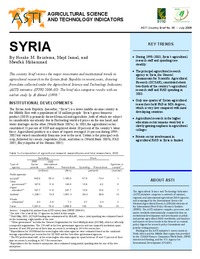Authors:
Beintema, Nienke; Jamal, Majd; Mohammad, Mwafak
Year:
2006
Publisher
International Food Policy Research Institute (IFPRI); and General Commission for Scientific Agricultural Research (GCSAR)
Back to:
Overall, agricultural research staff and expenditures in Syria increased in 2003 compared to the 1998 level. Nonetheless, research intensity levels in Syria are still lower than in other countries in West Asia and North Africa. In 2002, the organization of agricultural research in Syria was consolidated with the merger of nine preexisting agricultural research entities under MAAR to form GCSAR, which is largely funded by the national government but receives limited funding for research projects from bilateral and multilateral donors. Syria has a relatively low percentage of researchers trained to the MSc and PhD levels compared with other Middle Eastern countries and world regions. This is primarily the result of the lack of postgraduate training at Syrian higher education agencies until the mid-1980s. Despite these low qualification levels, many of GCSAR’s researchers are highly experienced due to their longstanding service with MAAR. Many of these senior staff will be due for retirement in the next 10 years, however, so ongoing training remains a high priority.
Agricultural research performed by the higher education sector is generally limited to student theses, although this situation is slowly changing as agricultural colleges incorporate research into their official mandates. While positive steps have been taken, such as establishing incentives toward research, most universities have limited resources in both the facilities and the funding necessary to launch viable research programs.
Insufficient water accessibility is an important constraint for the agricultural sector and water management and related issues are, therefore, significant research areas in Syria.

